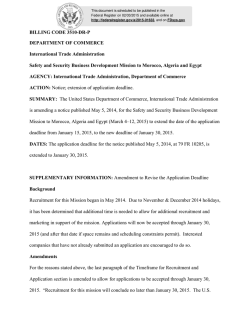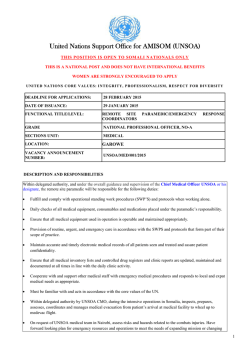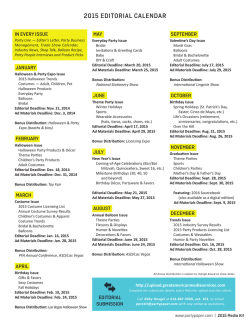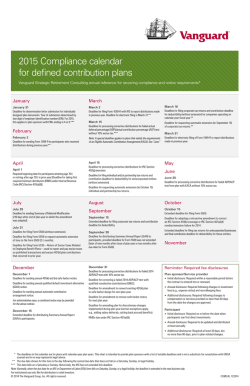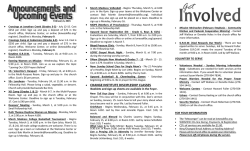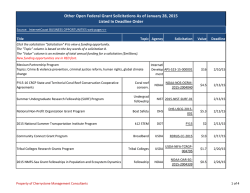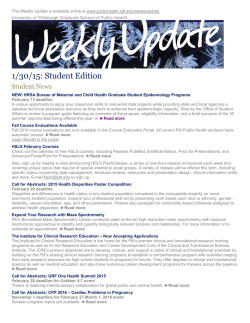
SUMMARY OF SOME OF THE 2099 CHANGES
SUMMARY OF SOME OF THE 2099 CHANGES TO THE FEDERAL RULES OF CIVIL PROCEDURE Rule 6(c)(1) Subject Matter of Rule Written Motions 6(c)(2) Written Motions – Opposing Affidavits 12(a)(1) Answers, Answers to Counterclaims, and Replies to Answers 12(a)(4)(A) Responsive pleadings 12(a)(4)(B) Responsive pleadings 12(e) Motion for More Definite Statement 12(f)(2) Motion to Strike 14(a)(1) Third Party Plaintiff New Deadline Written motion and notice of a hearing must be served at least 14 days before hearing Any opposing affidavit to a motion must be served at least 7 days prior to hearing Any answers, answers to counterclaims, and replies to answer are due 21 days after service. Responsive pleading after denial of Rule 12 motion must be served within 14 days Responsive pleading after service of a more definite statement under 12(e) is due 14 days after service of more definite statement Court may strike a pleading if the court orders a more definite statement and the order is not obeyed within 14 days after notice of the order. Motion to strike must be made before responding to the pleading or, if a response is not allowed, within 21 days after service of the pleading. A defending party, as a third-party plaintiff, may add a third-party defendant at any time, but it must obtain leave of court if it files a third party complaint more than 14 days after serving its original answer. Change from Old Deadline Previous deadline: 5 days Previous deadline: 1 day Previous deadline: 20 days Previous deadline: 10 days Previous deadline: 10 days Previous deadline: 10 days Previous deadline: 20 days Previous deadline: 10 days SIDLEY AUSTIN LLP 1 SUMMARY OF SOME OF THE 2009 CHANGES TO THE FEDERAL RULES OF CIVIL PROCEDURE Rule 15(a)(1) Subject Matter of Rule Amendments Change from Old Deadline Responsive pleading does not cut off right to amend. The new rule gives 21 days after a responsive pleading to amend. New Deadline Amendments to pleadings may be made as a matter of course: 1) 21 days after service or Responsive pleadings and motions under Rule 12(b), (e), or (f) are treated the same. 2) for pleadings to which a responsive pleading is required, 21 days after service of a responsive pleading or 21 days after service of a motion under Rule 12(b), (e), or (f), whichever is earlier. 15(a)(3) Responding to Amendments 23(f) Appeal of Class Certification Order 32(a)(5)(A) Depositions on Short Notice -- Use of Deposition at Trial 32(d)(3)(C) Objection to Written Deposition Questions 38(b)(1) Jury Demand Eliminates the reference to a “trial calendar” Deadline for responding to amended pleadings is 14 days Time for filing a petition for permission to appeal an order granting or denying class certification is 14 days after the order is entered. A deposition cannot be used against a party who received less than 14 days notice of the deposition and who promptly moved for a protective order that it not be taken. An objection to the form of a written re-cross question under Rule 31 is waived unless it is served to the party submitting the question within 7 days. Jury demand must be served no later than 14 days after the last pleading directed to the triable issue. Increases the time limits from 20 days to 21 days Previous deadline: 10 days Previous deadline: 10 days Previous deadline: 11 days Previous deadline: 5 days Previous deadline: 10 days SIDLEY AUSTIN LLP 2 SUMMARY OF SOME OF THE 2009 CHANGES TO THE FEDERAL RULES OF CIVIL PROCEDURE Rule 38(c) Subject Matter of Rule Jury Demand 50(b) Motion for Judgment as a Matter of Law 50(d) Motion for New Trial 52(b) Motion for Amended or Additional Findings 53(f)(2) Objections to Special Master’s Report 56(a) Summary Judgment Default Briefing Schedule New Deadline If a party had demanded a jury trial on only some issues, the other party has 14 days after being served with the demand to serve its own demand for a jury trial on all or some of the remaining Issues The deadline for a renewed motion for judgment as a matter of law is 28 days after the entry of judgment or 28 days after jury discharged. The deadline for a motion for new trial under Rule 59 by a party against whom judgment as a matter of law has been rendered is 28 days after entry of judgment. The deadline for a motion for amended or additional findings is 28 days after entry of judgment. Time to object to a Special Master’s report is 21 days after a copy of report is served. Unless a local rule or the court orders otherwise, a party may move for summary judgment any time until 30 days after the close of all discovery. Response brief must be filed within 21 days after service of motion or 21 days after a responsive pleading is due. Reply is due 14 days after the response is served. Change from Old Deadline Previous deadline: 10 days Previous deadline: 10 days Previous deadline: 10 days Previous deadline: 10 days Previous deadline: 20 days New default briefing schedule The amendment eliminates the requirement that “20 days have passed from commencement of the action” or that “the opposing party serves a motion for summary judgment” before the claiming party is allowed to file a motion for summary judgment. Summary judgment motion can be filed with Complaint under rules. SIDLEY AUSTIN LLP 3 SUMMARY OF SOME OF THE 2009 CHANGES TO THE FEDERAL RULES OF CIVIL PROCEDURE Rule 59(b) Subject Matter of Rule Motion for New Trial 59(c) Motion for New Trial – Opposing Affidavits 59(d) Order for New Trial on Court’s Initiative 59(e) Motion to Alter or Amend Judgment 62(a) Stay of Proceedings to Enforce Judgment 65(b)(2) Temporary Restraining Orders 72(a)-(b) Objections to Magistrate Judge’s Orders or Recommendations Change from Old Deadline Previous deadline: 10 days New Deadline The deadline for filing a motion for new trial is 28 days after entry of judgment The deadline for serving opposing affidavits to a motion for a new trial is 14 days. The deadline for a court to order a new trial on its own initiative is 28 days after entry of judgment. The deadline for a motion to alter or amend judgment is 28 days after entry of judgment No execution allowed on judgment until 14 days after its entry. A TRO expires at the time set by the court, which must be no later than 14 days after entry. The deadline for filing and serving objections to a magistrate judge’s order or recommendations is 14 days. Previous deadline: 10 days But the provision that allows the court to extend the deadline was removed. Previous deadline: 10 days Previous deadline: 10 days Previous deadline: 10 days Previous deadline: 10 days Previous deadline: 10 days 28 U.S.C. § 636(b)(1) has also been amended to accommodate this rule change to 14 days. SIDLEY AUSTIN LLP 4
© Copyright 2026

